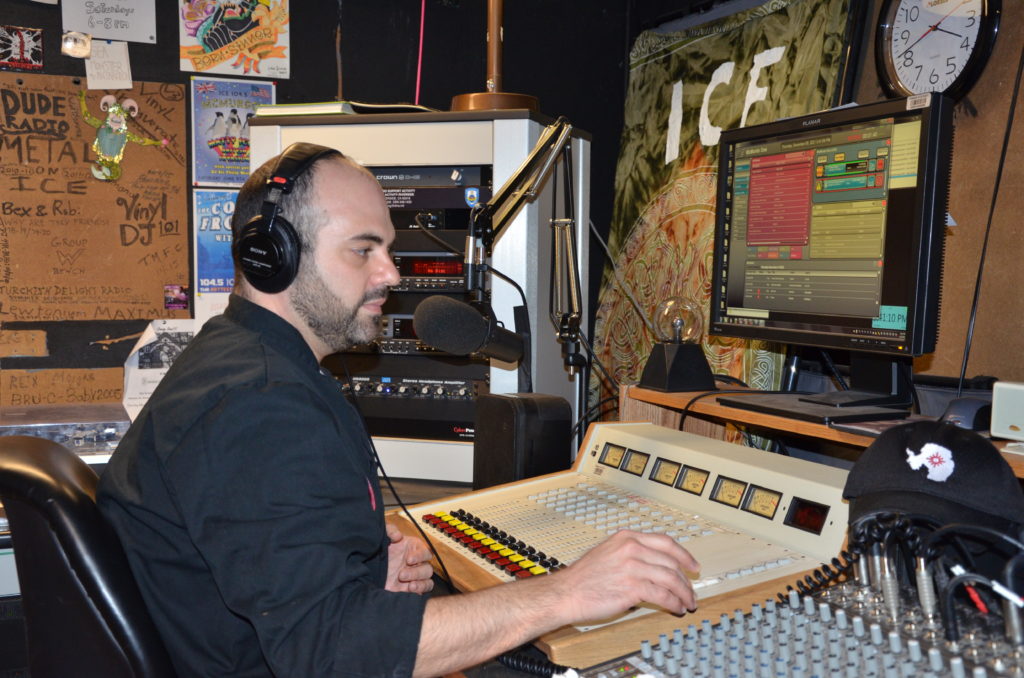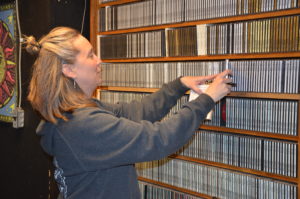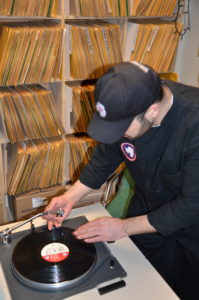In pictures, it’s difficult to say whether or not McMurdo Station is actually on the remote, icy planet Hoth from Star Wars. A cluster of low-lying dwellings sprout out from volcanic rock and are surrounded by miles and miles of snow and ice. But it is indeed located here on Earth, in Antarctica.
The American research base has been operating since 1955. In that desolate, frozen, isolation, scientists perform vital astrophysics, biology, geology, glaciology, geomorphology, ice core, ocean, and climate systems research. The station currently hosts a large staff of 600, which blossoms to around 1,000 during the “summer” season. That’s practically a small town, and like any small town, they need everyone from cooks, to welders, to police officers, to artists and writers.
There’s a bit of a chill in the air these days, but it’s nothing compared to the average -70.6 degrees Fahrenheit that the brave McMurdo employees face day in and day out. What do you do down there in your free time? What happens when the cold starts to get to you? You could head out into a storm, go snowblind, and freeze to death. Or, you could hunker down and tune into Antarctica’s only radio station: ICE 104.5 FM AFAN (American Forces Antarctic Network).

That’s right, somewhere down there, in a small room just off the mess hall, close to the southernmost point of our small blue planet, there’s a radio DJ spinning tunes for researchers, seals and penguins alike. Maybe even literally spinning, because although McMurdo Station uses modern radio technology, they are still holding onto a treasure trove of over 12,000 vinyl records, giving the airwaves — already a retro form of media — an even more nostalgic aura.
ICE FM is run by a team of volunteer disc jockeys from across the station: construction workers, military personnel, scientists, and ice divers sharing their eclectic taste with others far from home. Angelo Bovara is one of those DJs. He’s really down there as a production cook, feeding the station’s workers. “Today I made pork chops for 300 people,” he writes in an email. “Tomorrow I might be making 80 gallons of soup or 200 pounds of steak.”
Email was the best way to get in touch with Bovara. Internet bandwidth is a luxury at the station and is mostly reserved for scientific purposes, so a video call was basically out of question. It’s for that very reason that 104.5 is so important to Antarctica. “Bandwidth is at too high of a premium (and science dedicated) here to let everyone stream their own thing,” Bovara writes. “So we have the radio station.”
Kristyn Carney is the most experienced DJ on the base with almost 20 years under her belt, and has been working at the base since 1997 in various roles from cook to supervising fleet operations. She says that she had never considered becoming a DJ. “It kind of happened accidentally,” she says. “A friend of a friend had us on her show a couple of times, and I just thought, ‘Oh my goodness, this is amazing.’”

So what are DJs blasting 10 miles across the ice shelf? Quite a variety it turns out. Bovara personally likes to crank whatever metal he can get his hands on. “Dude, I played some friggin’ Metal Church (a west coast heavy metal band) on the radio! And most of [Metallica’s] …And Justice For All,” he boasts.
He also makes a point of playing the bumper music that the station has stored. “There are hours and hours of this stuff. I write, record, and produce my own music so I understand the work that goes into producing it. They may never know it was played and featured, but it was. And I hope somebody would do the same if they found my music lying around unheard.”
Carney starts every show with “Cecilia” by Simon & Garfunkel. “Then depending on my mood during the week, I’ll do an ‘80s show, or stick to even older songs. When I’m with my girlfriends we’ll do what we call ‘the quadrilogy,’ which is REO Speedwagon, Journey, Air Supply and Styx.”
As the veteran, Carney has a whole system, a 24-page spreadsheet with every song she enjoys that is available in the CD library at the station.
Ralph Maestas — who is stateside for a couple of months and was able to talk via Zoom — manages TV and radio operations at McMurdo. He says about 75 McMurdo employees volunteer during the summer, and 30 in the winter when the crew is smaller. He recounts that one of his German volunteers would do his whole show speaking German, but would only play old Latin jazz music on vinyl. “It was pretty popular,” he says. “You never hear that music.”

Others host talk shows and take calls from other McMurdo staffers just as any other radio station stateside would. Some interview the scientists at the station and talk about their research. “We actually had William Shatner call in one time,” Maestas boasts.
For these DJs, the station is as much something to do as it is a community builder. “You gotta do something,” Bavarro writes. “Some people go to the little library we have and read. Some people are cool and know how to make friends to hang out with. Some people hike up the mountain every day. I get on the radio twice a week and impose XTREME bumper music on 12 or 15 people.”
The station offers Carney respite from her daily duties of putting out fires and trying to make sure the base stays fully staffed. “It’s a place for me to go with one or two of my friends to play the music we like,” she says. “It’s also great for morale. It’s exciting. Most people in the real world won’t get an opportunity to work the DJ equipment that we have or host a show.”
Maestas agrees that ICE FM plays a vital role on the base and that’s reflected in the volunteer sign-up process. “For the last 10 years we’ve had an essay prompt on the back of the sign-up sheet to volunteer that asks them what they think it means to be a DJ in this community. Almost every response is that they want to give something back to the community.”

Leave a comment